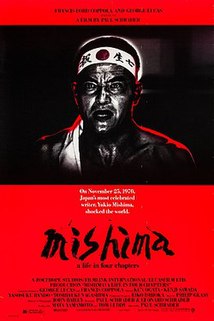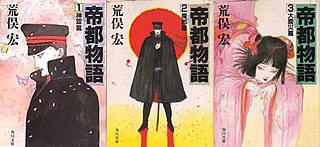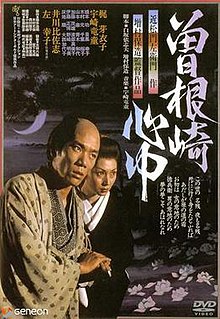Related Research Articles

Kon Ichikawa was a Japanese film director.

Kimitake Hiraoka, known also under the pen name Yukio Mishima, was a Japanese author, poet, playwright, actor, model, film director, nationalist, and founder of the Tatenokai. Mishima is considered one of the most important Japanese authors of the 20th century. He was considered for the Nobel Prize in Literature in 1968, but the award went to his countryman Yasunari Kawabata. His works include the novels Confessions of a Mask and The Temple of the Golden Pavilion, and the autobiographical essay Sun and Steel. Mishima's work is characterized by its luxurious vocabulary and decadent metaphors, its fusion of traditional Japanese and modern Western literary styles, and its obsessive assertions of the unity of beauty, eroticism and death.

Mishima: A Life in Four Chapters is a 1985 American biographical drama film co-written and directed by Paul Schrader. The film is based on the life and work of Japanese writer Yukio Mishima, interweaving episodes from his life with dramatizations of segments from his books The Temple of the Golden Pavilion, Kyoko's House, and Runaway Horses. Francis Ford Coppola and George Lucas were executive producers of the film.
Music is an art form consisting of sound and silence, expressed through time.

The Gakushūin (学習院) or Peers School, also known as Gakushūjo, is a Japanese educational institution in Tokyo, originally established to educate the children of Japan's nobility. Gakushuin is composed of Kindergarten, Elementary School, Middle School, High School, and University.

Teito Monogatari is an epic historical dark fantasy/science fiction work; the debut novel of natural history researcher and polymath Hiroshi Aramata. It began circulation in a literary magazine owned by Kadokawa Shoten in 1983, and was published in 10 volumes over the course of 1985–1987. The novel is a romanticized retelling of the 20th-century history of Tokyo from an occultist perspective.

Kyōko Kishida was a Japanese actress, voice actress, and writer of children's books. She is perhaps best known for her role in the 1964 film Woman in the Dunes.

Kajiyama Toshiyuki was a Japanese novelist active during the Shōwa period of Japan. He was known for his popular novels, which primarily consisted of mysteries and erotica.
Manji is the title of several Japanese films based on the Japanese novel Quicksand written by Jun'ichirō Tanizaki in 1928.
Nobuo Nakamura was a Japanese actor, who made notable appearances in the films of Akira Kurosawa and Yasujirō Ozu in the 1950s and 1960s. Perhaps his most famous roles in the West were those of the callous deputy mayor in Kurosawa's Ikiru (1952), and the hairdresser's henpecked husband in Ozu's Tokyo Story (1953).
Tamotsu Yato was a Japanese photographer and occasional actor responsible for pioneering Japanese homoerotic photography and creating iconic black-and-white images of the Japanese male. He was a friend and collaborator of the writer Yukio Mishima and the film critic Donald Richie, as well as a long-term romantic partner of Meredith Weatherby, an expatriate American publisher and translator of Mishima's works into English. Yato completed three volumes of photography.
Amon Miyamoto is a Japanese director of musicals, operas, plays, kabuki, noh and other art genres. He has directed over 120 productions worldwide.
Afraid to Die is a 1960 Japanese yakuza film directed by Yasuzo Masumura and starring Yukio Mishima.
The bibliography of Kimitake Hiraoka, pen name Yukio Mishima, includes novels, novellas, short stories and literary essays, as well as plays that were written not only in a contemporary-style, but also in the style of classical Japanese theatre, particularly in the genres of noh and kabuki. However, although Mishima took themes, titles and characters from the noh canon, he included his own twists and modern settings, such as hospitals and ballrooms, which startled audiences who were accustomed to the long-settled originals.

The Love Suicides at Sonezaki is a 1978 Japanese historical romance film directed by Yasuzo Masumura starring Ryudo Uzaki and Meiko Kaji based on the Chikamatsu play of the same name.

Blind Beast, aka Moju the Blind Beast is a 1969 Japanese film directed by Yasuzo Masumura. It is based on a novel by Edogawa Rampo.
Aoi is a 2000 Japanese historical drama television series and the 39th NHK taiga drama. The series respectively stars Masahiko Tsugawa, Toshiyuki Nishida, and Onoe Tatsunosuke II as the first three Tokugawa shōguns. It aired from January 9 to December 17, 2000, and ran for a total of 49 episodes.
Shirō Moritani was a film director and screenwriter from Japan. Born in Tokyo, he debuted as an assistant director in Akira Kurosawa's 1961 film Yojimbo. His film Mount Hakkoda won Mainichi Film Award for Excellence Film in 1978.
The Sword is a 1964 Japanese film directed by Kenji Misumi. From a screenplay by Kazuro Funabashi, based upon the short story Ken (Sword) by Yukio Mishima.
Yakuza Zessyō is a 1970 Japanese film directed by Yasuzo Masumura. Katsu and Masumura worked together for the first in 5 years. It is based on Jūgo Kuroiwa's novel Nishi Naruyama Hotel Gake no Hana. The movie depicts a man's unusual love for a younger sister.
References
- ↑ Ecran - Issues 21-26 1974- Page 55 ONGAKU (La musique - 1972), de Yasuzo Masumura.
- ↑ Psychotherapists on Film, 1899-1999: M-Z - Page 412 0786419083 John Flowers, Paul Frizler - 2004 - Music, aka Ongaku. 1972, Art Theatre Guild, Japan, 104 min. Director: Yasuzo Ma- sumura. Screenplay: Yasuzo Masumura. Based on a novel by Yukio Mishima. Cast: Noriko Kurosawa, Toshiyuki Hosokawa, Nogahide Takahashi, ...
- ↑ Limes: Mishima e i due lati del radicalismo - Page 313 8827836519 - Antonio Rossiello - 2018 - Musica. Nel 1972 il regista giapponese Masumura Yasuzo diresse una riduzione cinematografica del romanzo di Mishima Musica (Ongaku,音楽), sceneggiatura di Yasuzô Masumura, Yukio Mishima, cast di attori: Noriko Kurosawa (Reiko ..
| This article related to a Japanese film of the 1970s is a stub. You can help Wikipedia by expanding it. |